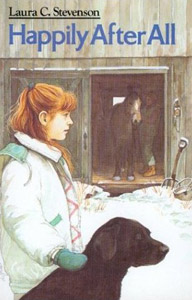A New Series: One Minute Reviews of
Books by Vermont Authors
Laura's column "One Minute Reviews" has appeared bi-weekly in Wilmington, Vermont's Deerfield Valley News since 2015. In April 2018, she found that no Vermont periodical consistently reviews all commercially published fiction and non-fiction by Vermont authors, so she started a series to fill that void. Published reviews from that series and some earlier reviews of local authors are listed with links to a scan of the printed copy. Reviews still in queue are listed without links until they appear in print.
The books reviewed in this series are available through Wilmington's Pettee Memorial Library, the Whitingham Free Public Library, and locally owned Bartleby's Books in Wilmington.
Deerfield Valley News, 6/13/2019
Black Humor and Parts Cars
J.C. Myers, Junkyard at No Town. Rootstock Publishing, 2019.
Jules Alpert, who has just graduated from college in 1980, has long had a passion for collecting "the failed brainstorms of the commercial world, the spun-out spin-offs, items with an interesting story, ill-fated things that [have] once been treasured." Or, in the language of his Westchester County parents, junk. Faced with his mother's pressure to look for jobs in the City, Jules retreats to Iraton, Vermont, the home of his hippie Aunt Martha. Once there, he finds that Aunt Martha, who once earned a living as the producer of a potent strain of marijuana, has been forced to turn realtor by the Reagan-era arrests of other local growers. She is thus in a position to oversee Jules's purchase of a monumental junkyard of 1950's cars and trucks, together with twenty acres and a derelict trailer. Jules closes the deal in person with Lutheria Tupper, once a beauty famous for shooting her first husband and for keeping a still during Prohibition, but now an old lady on a bicycle. She suggests that Jules hire Butchy Guyette, a destitute illiterate who "fixes things." Butchy provides Jules with the skills he conspicuously lacks; he also provides a link to locals who share his taste for weed. Through them, Jules encounters Arden Gabert, the town's chief drug supplier—and, incidentally, a man who bears Butchy a grudge.
As Jules settles into the parts-selling business, he literally runs into Byron Peas, a fourteen-year-old who bit an electric cord at the age of four and subsequently stopped talking. Having left his abusive home, Byron lives on the charity of the town and of his beautiful sister, Maddy Gabert, who is married to Arden's slow-witted, affectionate brother. Jules teaches Byron to drive; he also encounters and falls in love with Maddy. As Jules moons about his first real love, Arden buys a stolen Lotus Elan from his drug suppliers in Boston; on a cold night, he leaves it running outside the bar. Byron, happening by, takes it for a spin and can't bear to return it. Neither Arden nor Byron knows there is $250,000 worth of coke in the un-openable trunk, but the professional Boston criminals do, and they come to Iraton to collect it. At gun-point, Arden tells them Butchy is hiding the car in Jules's junkyard, and the result is a mock-epic battle, a fire, and a miraculous event.
As the outrageously funny criminal story progresses, an interwoven series of tales reveals that there has always been a hint of the miraculous in Iraton. Jules's junkyard borders on a tract of land called No Town. It's a forest bowl that was ignored in the original survey of the area—either (as we are originally told) because the surveyors were drunk or (as we discover gradually) because it is a sacred space into which some people, including its first settlers, have inexplicably disappeared. Lutheria, a fiercely intelligent, unrecognized shaman, understands the place's powers and shows it to Jules, who quickly believes. Martha, however, enters a partnership with the town's entrepreneur, and the two of them select No Town as the perfect place for a landfill. The concluding chapters braid the junkyard, No Town, and Jules's increasing respect for Lutheria into an ending that gives junk a whole new meaning.
For those with a taste for black humor, this a wonderful book. Its fascination with old cars rings absolutely true, and its slap-stick comedy is laugh-aloud funny. Throughout, it is laced with love for Vermont and its beauties, but also sorrow for its tragedies. Behind its dead-pan tone lies a deep, compassionate understanding of rural poverty, violence, abuse, wasted feminine intelligence, and ecological destruction. Read it, laugh and weep.


